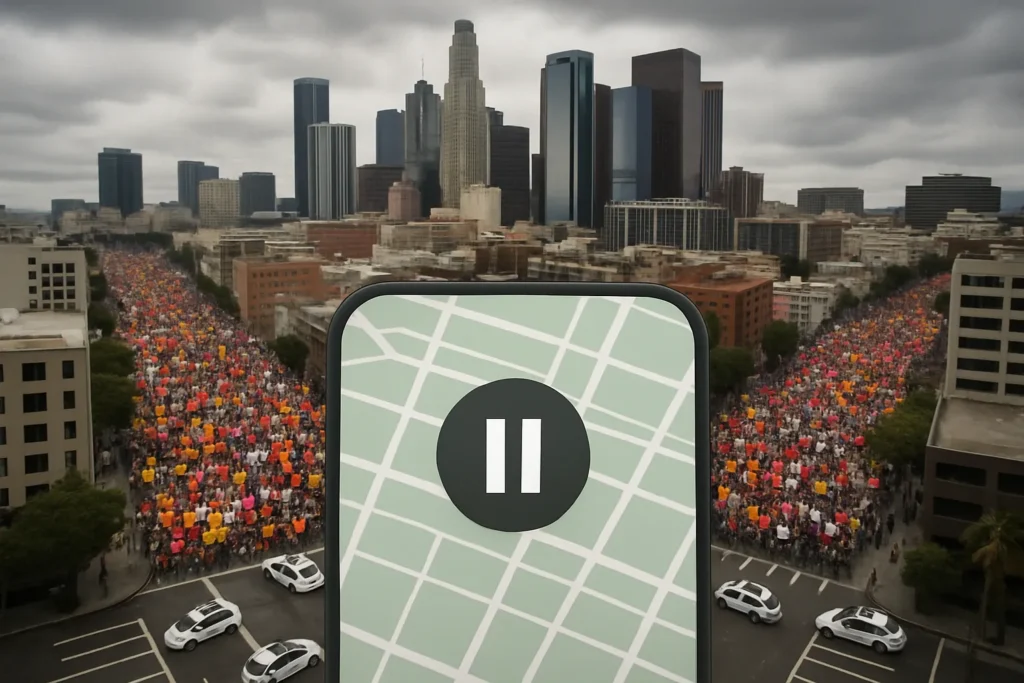Protests Spark Unprecedented Damage to Waymo Vehicles
Amid intense protests centered around immigration enforcement raids in downtown Los Angeles, several autonomous vehicles belonging to Google subsidiary Waymo were severely vandalized and set ablaze. This unexpected escalation occurred on Sunday, when demonstrators protesting against immigration policies enacted under former President Donald Trump targeted a line of driverless Waymo electric vehicles. The destruction of these vehicles, valued at approximately $200,000 per vehicle, has led Waymo to halt all autonomous taxi operations in affected downtown areas.
According to reports, at least five Waymo self-driving Jaguar I-Pace electric vehicles were set on fire during the unrest. Images captured at the scene show vehicles engulfed in flames and smoke, marked with anti-ICE and anti-Trump messages. The vehicles were specifically targeted by some protesters amid broader disturbances involving looting and damage to downtown businesses such as Jordan Studio 23, T-Mobile, and Adidas stores.
Waymo has confirmed that the suspension of its services in downtown Los Angeles was implemented upon guidance from local law enforcement. A company spokesperson emphasized that the suspension is purely precautionary, adding that the attacks were not believed to be a direct targeted action against Waymo itself.
“We will not be serving any rides in the protest area until it is deemed safe,” said the Waymo spokesperson.
The Los Angeles Police Department (LAPD) issued warnings regarding the potential dangers posed by burning lithium-ion batteries within the vehicles, highlighting risks of toxic gas emissions, including hydrogen fluoride, to first responders and nearby civilians.
Escalating Tensions Amid Federal-State Discord
These violent incidents mark a significant escalation in the ongoing protests triggered by recent immigration raids conducted by Immigration and Customs Enforcement (ICE). The unrest in Los Angeles intensified significantly after former President Trump controversially deployed approximately 2,000 California National Guard troops to LA, bypassing normal procedure by ignoring objections from California Governor Gavin Newsom.
In an unprecedented move, this federal deployment of the National Guard was intended to support ICE operations rather than traditional law enforcement duties. This action was widely criticized within California, sparking public outcry and further energizing protests. Governor Gavin Newsom has publicly called Trump’s action illegal, intensifying state-federal tensions already heightened by conflicting stances on immigration enforcement. Demonstrations began after a high-profile ICE raid, targeting an employer reportedly using falsified documents for its workers.
This deployment of troops without state approval echoed a historical precedent set in 1965, marking the first time in decades a president has ordered National Guard troops into a state over gubernatorial objections. California Governor Gavin Newsom responded by stating that Trump’s decision represents a concerning misuse of federal power, accusing the former president of exacerbating tensions rather than addressing underlying issues.
“This illegal deployment of troops only inflamed the situation, leading directly to further unrest,” Governor Newsom stated publicly in response.
Experts analyzing the situation suggest that the protests’ targeting of Waymo vehicles may reflect broader frustrations over job losses and societal impacts associated with increased reliance on autonomous technology. Waymo, which recently announced significant expansions, including transforming facilities in Mesa, Arizona, to accommodate the conversion of 2,000 Jaguar I-Pace electric vehicles into autonomous taxis, is deeply invested in gaining public acceptance for its technology.
Implications for Autonomous Vehicle Companies
These incidents have ignited broader conversations regarding the integration of autonomous vehicles into urban settings, particularly in relation to public safety during civil unrest. Historically, autonomous vehicle deployment has faced intermittent resistance, with opponents frequently citing job displacement and safety concerns. Sunday’s incidents in Los Angeles underline the vulnerabilities autonomous vehicles might face during periods of widespread civil disturbance.
Industry observers note that the incident may impact public perception and acceptance of autonomous vehicles, potentially affecting future regulatory decisions and deployment strategies. The incident emphasizes the importance of robust community engagement efforts for companies like Waymo. Prior to these events, Waymo had actively been hiring Community & Public Affairs Specialists in Los Angeles to foster local trust and acceptance of their services.
Moreover, the estimated financial losses from the destroyed vehicles, which amount to at least $1 million in this instance, highlight potential economic risks associated with operational disruptions during civil unrest. For a company like Waymo, whose fleet in Los Angeles includes approximately 100 vehicles, losing even a handful disrupts operations considerably.
In the wake of these events, authorities and industry stakeholders are expected to revisit strategies for deploying and securing autonomous vehicles in urban environments. Future policies may include enhanced security measures, revised operational protocols during emergencies, and strengthened local engagement to mitigate such incidents.
Overall, the turmoil represents a stark intersection between technological advancement, federal immigration policy, and public unrest, emphasizing the complexity of integrating advanced technology into society during contentious ideological conflicts.


